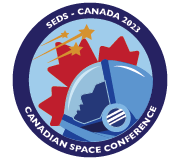Speakers
Welcome to the heart of the Canadian Space Conference — our exceptional lineup of speakers who are industry leaders, experts, and visionaries in the field of space exploration. As we delve into the cosmos and explore the latest advancements in space technology, our speakers bring a wealth of knowledge and experience to the forefront. Discover the faces and minds behind the innovations shaping the future of space exploration.
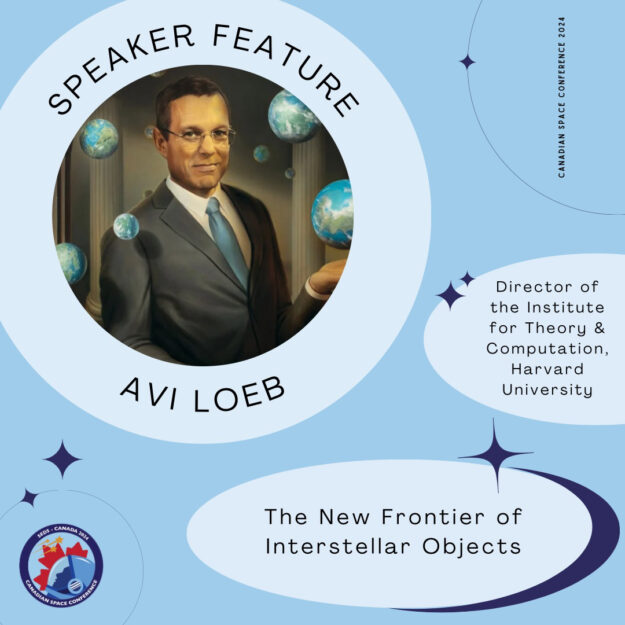
Professor Avi Loeb, Director of the Institute for Theory and Computation and Head of the Galileo Project, Harvard University.
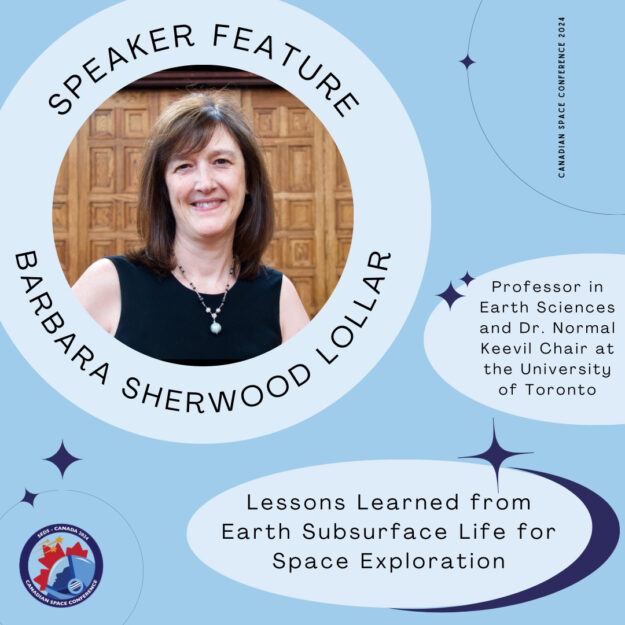
Barbara Sherwood Lollar is a University Professor in Earth Sciences and Dr. Normal Keevil Chair at the University of Toronto. She is Co-Director of the CIFAR program Earth 4D – Subsurface Science and Exploration.
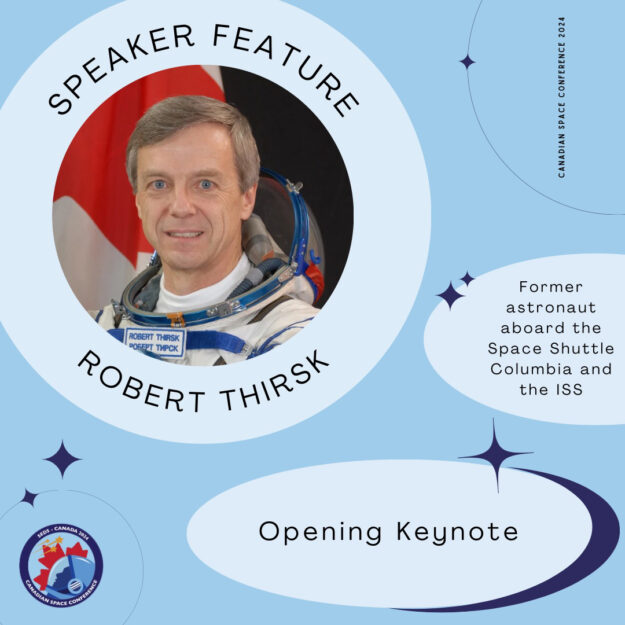
Dr. Robert Thirsk received degrees in Mechanical Engineering, Medicine and Business Administration from the University of Calgary, MIT and McGill University. Bob has flown on two spaceflights: a mission aboard the shuttle Columbia and an expedition aboard the International Space Station. He continues to promote a national economy based upon exploration, innovation and lifelong learning.
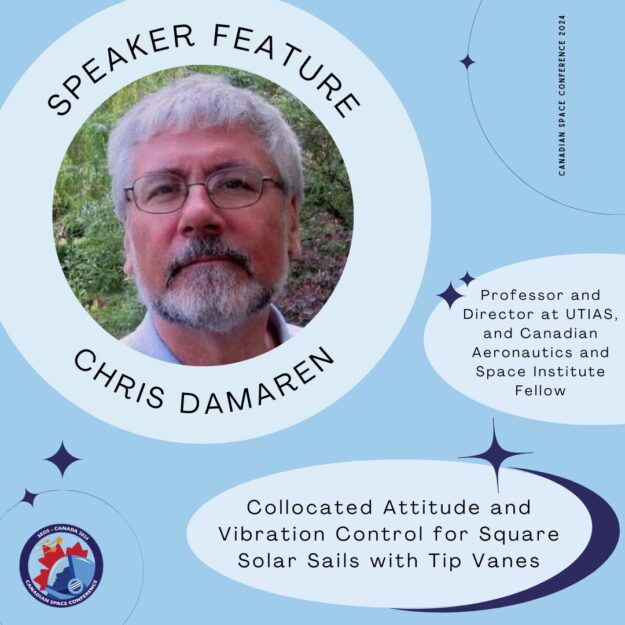
Chris Damaren received the BASc in Engineering Science (Aerospace Option) from the University of Toronto in 1985. He went on to receive the MASc and PhD degrees in 1987 and 1990, respectively, both in aerospace engineering from the University of Toronto Institute for Aerospace Studies (UTIAS). From 1990 to 1995 he was an Assistant Professor in the Department of Engineering at Royal Roads Military College in Victoria, British Columbia, Canada. From 1995 to 1999 he was a Senior Lecturer in the Department of Mechanical Engineering at the University of Canterbury in Christchurch, New Zealand. Since 1999 he has been at UTIAS and is currently a Professor and the Director. From 2008 to 2013, he served as the Vice-Dean Graduate Studies for the Faculty of Applied Science and Engineering. His research interests are in the areas of dynamics and control of space systems. He is a Fellow of the Canadian Aeronautics and Space Institute and an Associate Fellow of the American Institute of Aeronautics and Astronautics.
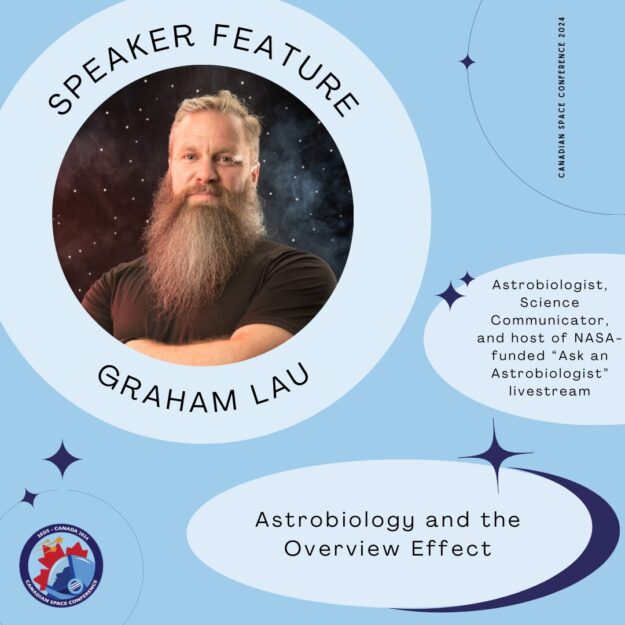
Dr. Graham Lau is an astrobiologist, science communicator, and storyteller. Holding extensive academic knowledge in biology, chemistry, astrophysics, and geology, he specializes in examining life’s influence on its environment and our pursuit of extraterrestrial life forms. Dr. Lau’s research has taken him to the Canadian High Arctic and multiple global particle accelerators for x-ray spectroscopy studies. As the host of the NASA-funded “Ask an Astrobiologist” livestream, he illuminates the intriguing field of astrobiology for a broad audience.
In his current role, Dr. Lau expertly steers the communications and marketing strategies for Blue Marble Space, a forward-thinking nonprofit. Additionally, he actively contributes to scientific progress as a Research Scientist with the Blue Marble Space Institute of Science. Dr. Lau also oversees logistics for the University Rover Challenge, an undergraduate robotics competition centered on Mars rovers, fostering the next generation of robotic engineers.
Dr. Lau’s passion for sharing knowledge extends beyond the field of astrobiology. He has inspired students worldwide through public lectures, podcast interviews, and his compelling perspectives on our cosmic significance, the Overview Effect, and the future of civilization. Beyond his scientific pursuits, Dr. Lau imparts wisdom as a meditation instructor and cultivates confident speakers as a public speaking coach. His diverse expertise underlines his commitment to education, personal growth, and the exploration of our place within the cosmos.
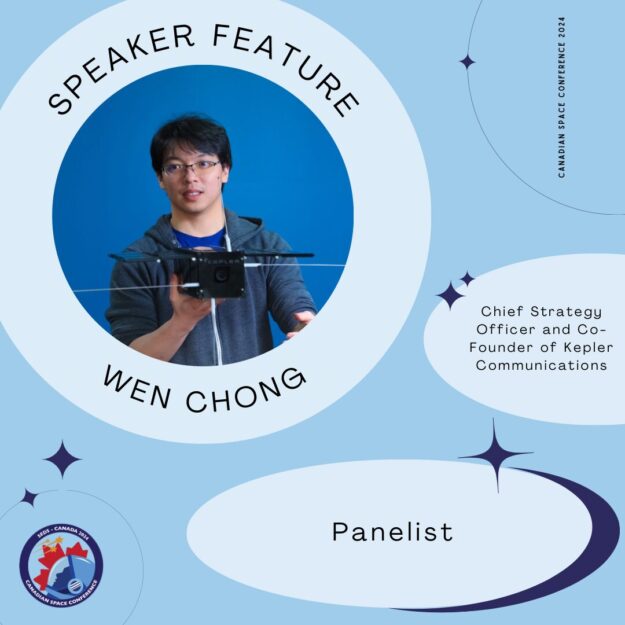
Wen Chong, as the Chief Strategy Officer and Co-Founder of Kepler Communications, spearheads the development of a pioneering space-based Internet system, enhancing access to space-generated data. His expertise drives Kepler’s strategic direction and global positioning. Known for his innovative approach, Wen led the creation of the world’s first Ku-band Cubesat, achieving launch within a groundbreaking 12-month timeframe. He has been instrumental in advancing Kepler’s vision through the successful implementation of inter-satellite RF and laser communications. A distinguished alumnus of the University of Toronto’s Engineering Science program, Wen majored in aerospace engineering and graduated at the top of his class. Before his tenure at Kepler, he contributed to next-generation business jet designs at Bombardier Aerospace.
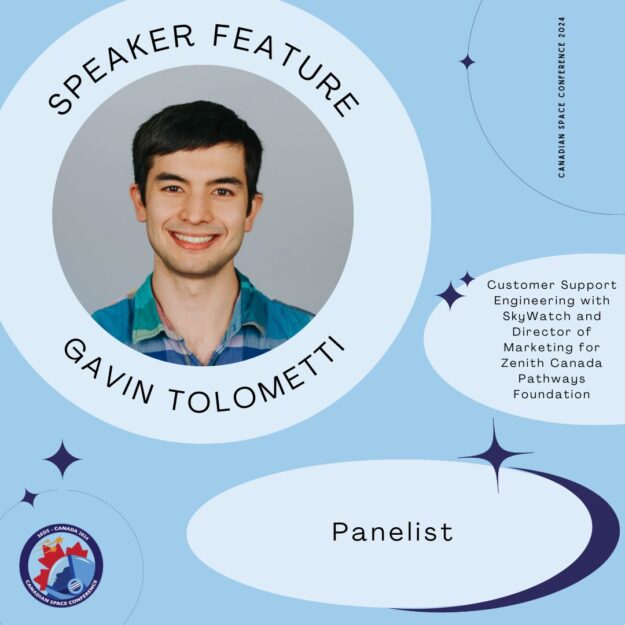
Gavin Tolometti is a Customer Support Engineering with SkyWatch, in Kitchener-Waterloo Ontario. His role involves providing customer services for clients acquiring and purchasing satellite imagery, and works to consult knowledge on the use of satellite imagery for Earth Observation. Gavin is passionate about remote sensing data analysis and Earth Observation, stemming from his previous role as a postdoctoral associate and PhD candidate at Western University where his research focus was on understanding how lava flows on Earth (completed up to six successful field expeditions in Idaho, Iceland, Lanzarote, and northern Labrador), which are similar to lunar and Martian lava flows, are emplaced based on radar observation data. Gavin’s research background includes geologic fieldwork, geochemistry, mineralogy, remote sensing, and planetary image analysis. Gavin always looks to support students and young professionals wanting to enter the space industry through his role as the Director of Marketing for Zenith Canada Pathways Foundation. He is an avid supporter of science communication and outreach (before SkyWatch, he was an Outreach Coordinator with Western University’s Faculty of Engineering), and is the once creator and host of the space podcast “The Diaries of Space Explorers”.
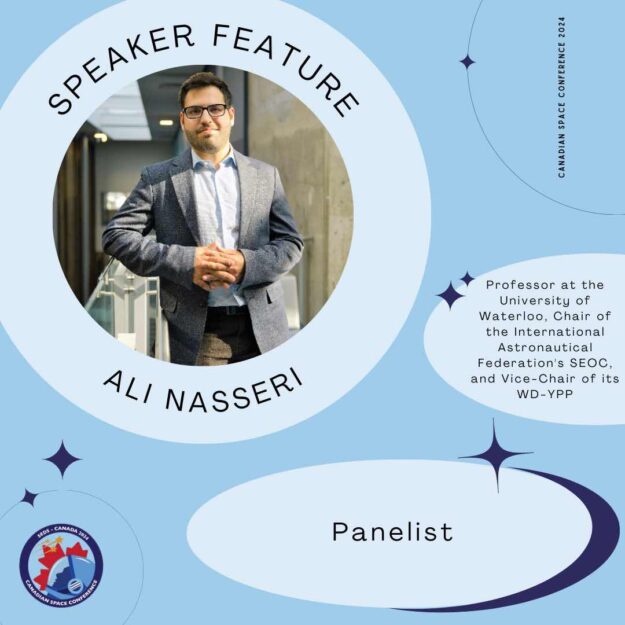
Dr. Ali Nasseri is a lecturer at the University of Waterloo, supporting the Science and Business Program. He is also the Chair of the International Astronautical Federation’s Space Education and Outreach Committee (SEOC), and Vice-Chair of its Workforce Development-Young Professional Program (WD-YPP) committee. Ali’s broad experiences range from designing aerospace systems to supporting research commercialization to running global nonprofits in the space sector.
Prior to joining the University of Waterloo, Ali was working as an engineer with the Canadian Space Agency, supporting safety and mission assurance, and radiation susceptibility analysis on missions such as Canadarm3, Lunar Rover Mission and the Canadian Cubesat Project. He was also an instructor at McGill University where he taught Creativity and Innovation for Entrepreneurs.
Before that, Ali worked as an Executive Research Coordinator at the University of British Columbia for 3 years, where he managed a portfolio of research projects focused on AI and machine learning, and led research partnership activities in the department of Computer Science. Concurrently, he was a sessional lecturer at UBC Physics, and the program coordinator and instructor for Selkirk College’s Engineering Transfer Program where he taught engineering design. Other experiences he’s had include working as a consultant for the Moon Village Association, Defence Research and Development Canada, and Wevolver, and Chairing the Space Generation Advisory Council in Support of the UN Programme on Space Applications. He is a graduate of the International Space University’s Space Studies Program 2014.
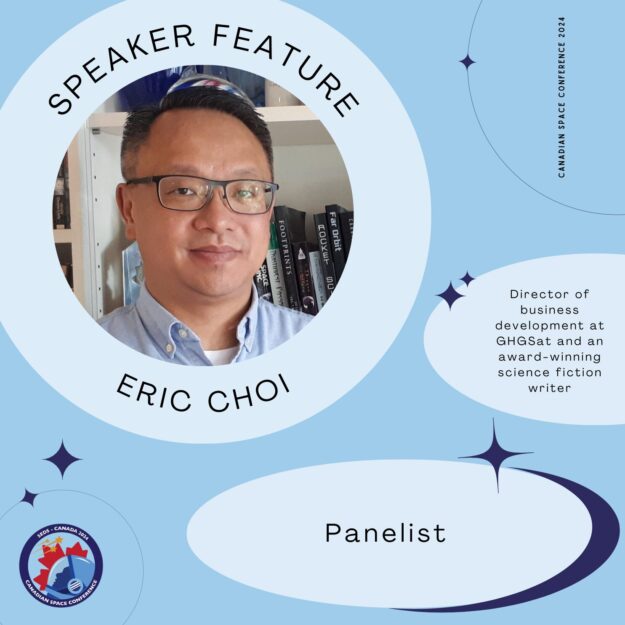
Eric Choi is director of business development at GHGSat. Over the course of his career, he has held positions of increasing technical and managerial responsibility in both the aviation and space sectors, the latter including work on QEYSSat (Quantum Encryption and Science Satellite), the Meteorology (MET) payload on the NASA Phoenix Mars Lander, the Canadarm2 on the International Space Station, the RADARSAT-1 Earth-observation satellite, and the MOPITT (Measurements of Pollution on the Troposphere) instrument. Eric holds a B.A.Sc in Engineering Science and an M.A.Sc in Aerospace Engineering, both from the University of Toronto, an MBA from York University, and he is an alumnus of the International Space University. He is also an award-winning science fiction writer.
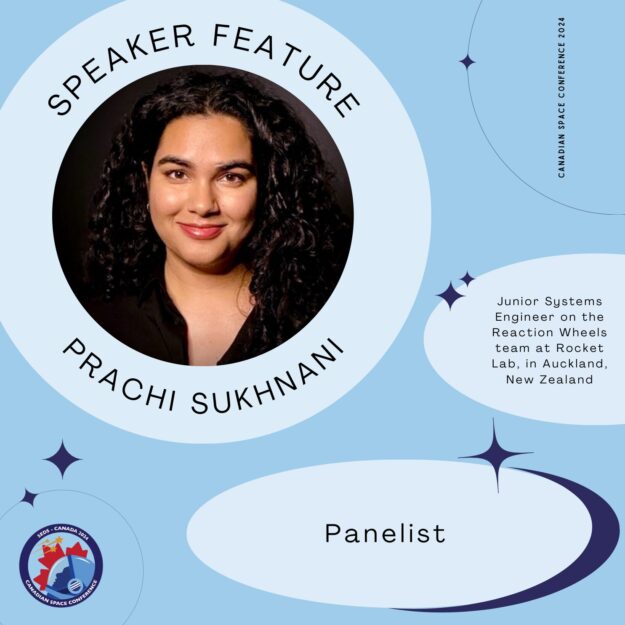
Prachi is a Junior Systems Engineer on the Reaction Wheels team at Rocket Lab, in Auckland, New Zealand. She graduated from the University of Toronto in 2023 with a BASc. in Engineering Science (Aerospace Option). Set on working in the space industry, she carved and found unique opportunities to develop her knowledge of space systems engineering throughout her undergrad, including a year-long internship at Sinclair Interplanetary by Rocket Lab in Toronto. During her tenure at the University of Toronto Aerospace Team’s Space Systems Division from 2019 to 2023, she took on a few key technical and leadership roles to drive and support HERON and FINCH CubeSat missions. She has served as Mission Operations Lead for HERON, Chief Systems Engineer for FINCH, and the Director of Space Systems. She is passionate about supporting young engineers in discovering their unique trajectories in this exciting field.
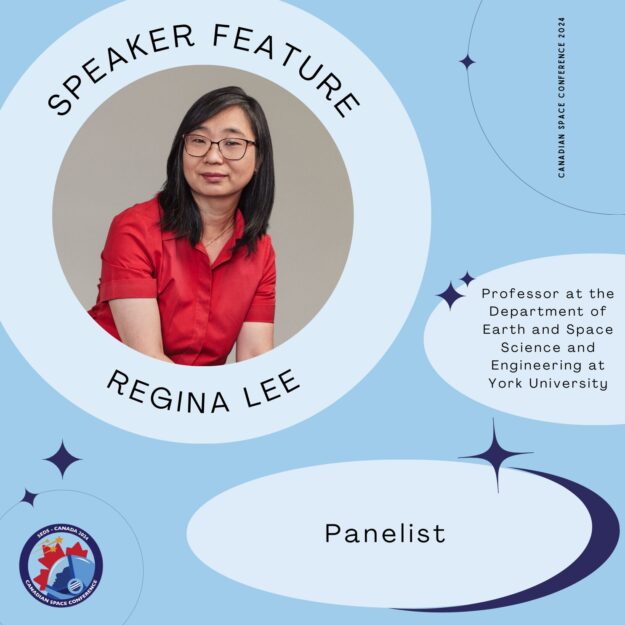
Regina Lee, PhD, PEng is Professor at the Department of Earth and Space Science and Engineering, York University, Toronto, Canada. Prof. Lee received her Ph.D. from the University of Toronto in 2000. It has been a focus of Prof. Lee’s research to develop a series of satellite technologies that will lead to scientific nanosatellite missions. Currently, she’s investigating several areas including MEMS based attitude sensors and actuators to incorporate their low-grade characteristics; and optical payloads including a star tracker for Resident Space Object (RSO) detection, identification and characterization with light curve analysis.
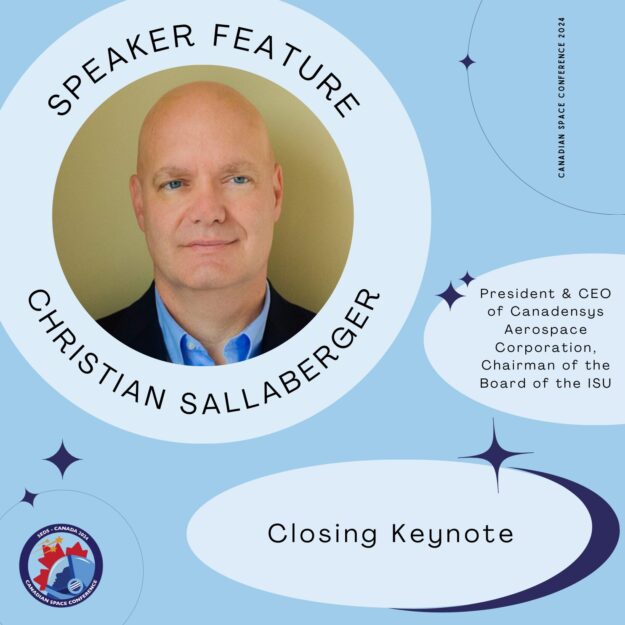
Dr. Christian Sallaberger is President & CEO of Canadensys Aerospace Corporation, a Canadian space systems company he founded in 2013 that is internationally active in both the government and commercial sectors. With a focus on space exploration, Canadensys is launching an observatory to the Moon’s south pole in February this year, is designing and building Canada’s first lunar rover for the Canadian Space Agency, and supplies lunar science instruments to NASA, among many other missions and programs. Prior to assuming the leadership of Canadensys, he held the roles of Vice President and Director of Space Exploration at MDA. Previously he has worked for the Canadian Space Agency where he created the agency’s Space Exploration program, as well as the European Space Agency and IBM.
He also serves as Chairman of the Board of the International Space University which has its main campus in Strasbourg, France. He is past Chairman of the IAF International Space Exploration Committee, a member of the International Program Committee of the International Astronautical Conference, a director of the US-based International Lunar Observatory Association as well as a trustee of the UK-based International Institute for Space Commerce, and an appointed lifetime member of the International Academy of Astronautics. He is a frequently invited speaker at national and international symposia, colloquia, and government summits.
Dr. Sallaberger obtained engineering degrees from the University of Waterloo in Canada, the University of California at Berkeley, and received his doctorate in Aerospace Science and Engineering from the University of Toronto.
He is an adjunct Professor of Aerospace Science and Engineering at the University of Toronto and a visiting faculty member of the International Space University.
He has represented the Government of Canada on the International Mars Exploration Working Group (IMEWG), and was a member of the Japan-Canada Space Panel. He currently sits on the boards of several corporations and charitable foundations. He speaks a number of languages, and is married with three children.
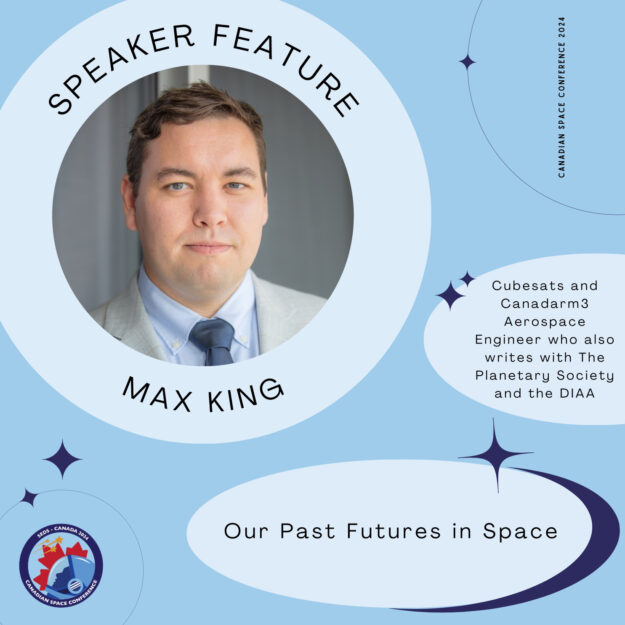
Max King is an Aerospace Engineer whose work in the Canadian space sector spans from Cubesats to Canadarm3. He expresses his passion for space exploration through his outreach work, which includes writing with The Planetary Society and the Dunlap Institute for Astronomy and Astrophysics. He was formerly a Youth Council member to Canada’s Chief Science Advisor for matters on space exploration, and seeks to inspire all Canadians to strive for a peaceful human future in space.
Session description: This talk explores the many visions humans have had of one day living off our world; and how those dreams have become a reality. Exploring Science Fiction and Engineering from the last 150 years, we will examine how our visions of humans in space have changed over time. We will learn what the past and present have looked like for humanity off world, and what the future may one day hold.
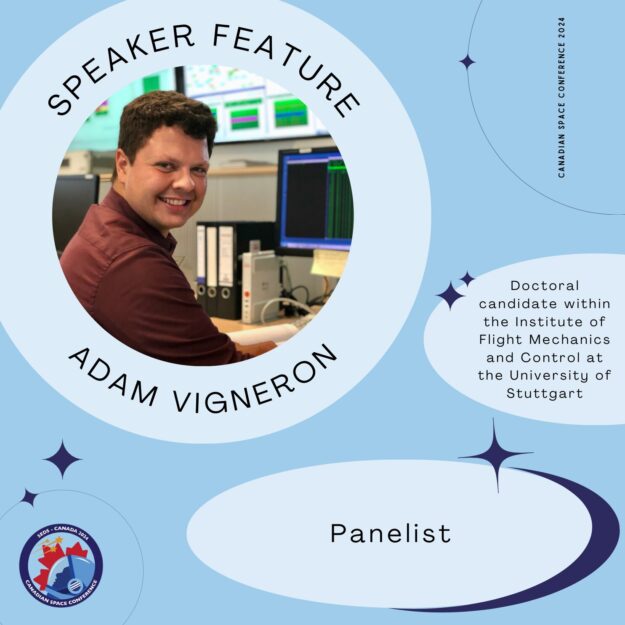
Adam Vigneron is a doctoral candidate within the Institute of Flight Mechanics and Control at the University of Stuttgart, working in close collaboration with Science Future Programmes at Airbus Defence and Space. Adam’s doctoral research focuses on methods of unified attitude control for the fast acquisition and re-acquisition of low-bandwidth scientific satellite constellations.
Before resuming his studies, Adam spent three years at the European Space Operation Centre (ESA/ESOC) working as a contractor in support of navigation experimental operations for Galileo. His MASc thesis, written at Magellan Aerospace (Ottawa) on contract for the Canadian Space Agency, examined methods of autonomous navigation for spacecraft in highly elliptical orbit.
Adam has been active in various corners of the space community for well over a decade, including paid and volunteer positions with the Canadian Space Agency, the Canadian Space Society, the International Space University, the Space Generation Advisory Council, and Young ESA.
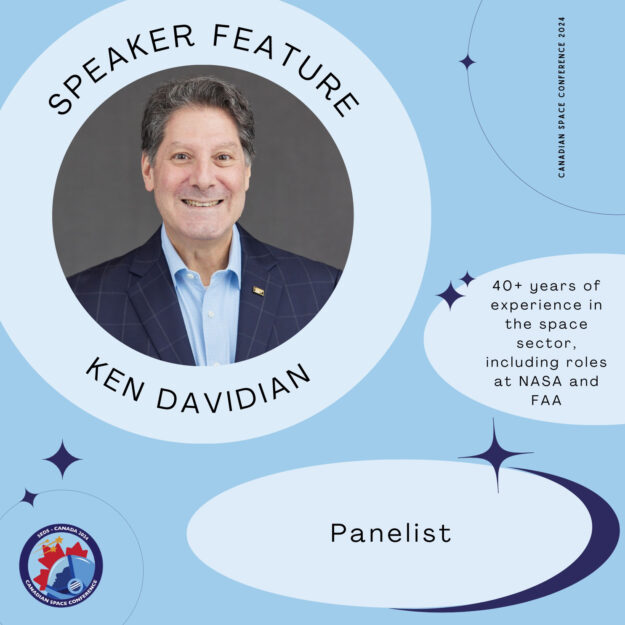
Dr. Ken Davidian has 40+ years of experience in the space sector, including roles at NASA and FAA. He currently holds key positions at the International Space University and New Space journal and is also affiliated with Virginia Tech, AIAA, IAF, and IAA. Dr. Davidian has degrees in Aeronautical Engineering, Mechanical Engineering, and a doctorate in Business Administration focused on innovation in space markets.
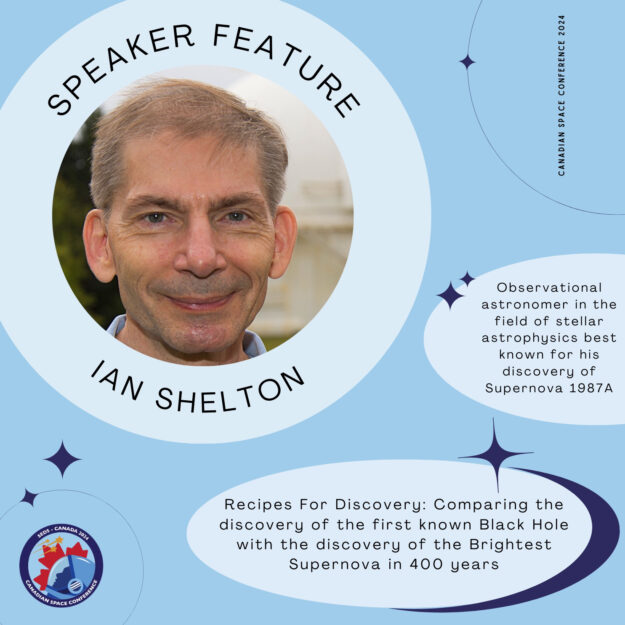
Dr. Shelton is an observational astronomer working in the field of stellar astrophysics. He has helped construct, operate, and do research at several major observatories located in Canada, the United States, Hawaii, and Chile. His research focuses mainly on the formation and evolution of stars, and he is probably best known for his discovery of Supernova 1987A. Ian currently teaches at several Universities in Toronto and also spends a lot of his time working with the David Dunlap Observatory Defenders (aka DDOD). This not-for-profit group delivers a wide range of Public Outreach programs at the David Dunlap Observatory in Richmond Hill, home to the largest optical telescope in Canada and where Black Holes were first definitively proven to exist.
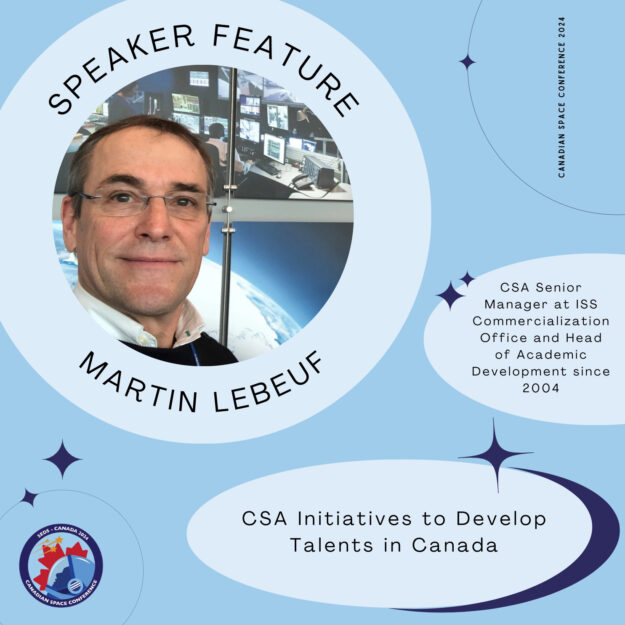
Martin Lebeuf joined the Canadian Space Agency (CSA) in 2000 as Senior Manager, ISS Commercialization Office. Since 2004, as Head, Academic Development, Martin Lebeuf is responsible for developing and managing grant and contribution funding programs aiming at developing Highly Qualified Personnel (students and Post-Doctoral Fellows) through college and university space research projects that provide hands-on training opportunities to students as well as thought initiatives specifically designed for students such as, participation in international conferences and internships. Martin is the CSA representative on the International Space Education Board (ISEB) Working Group as well as a member of the Northern Scientific Training Program Management Committee of Polar Knowledge Canada.
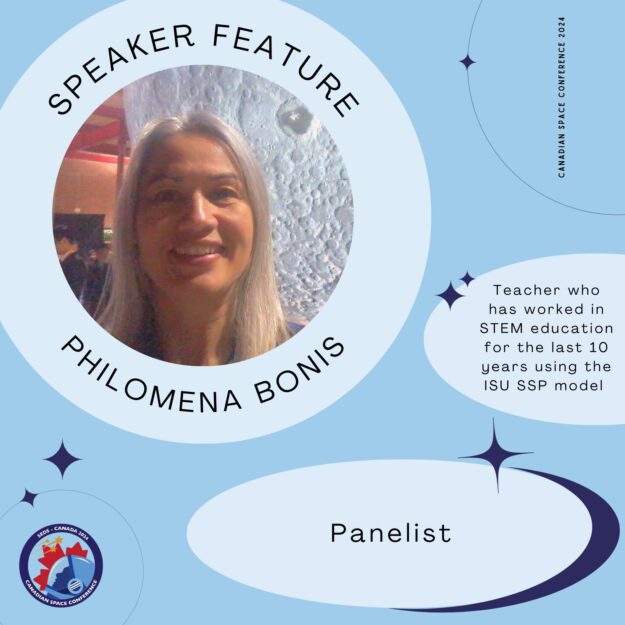
Philomena Bonis is an Ontario Certified Teacher OCT who has worked in STEM education for the last 10 years using the ISU SSP model for the understanding and appreciation of the Cosmos through the constant evolution of new perspectives and approaches in relevant STEAM areas of study. As an ISU alumna, she has used the 3Is – where all disciplines are vital for understanding and effectively dealing with complex off earth habitation issues; using the international human resources of her 5400 alumni, 300+ adjunct faculty and the intercultural representation of her middle school STEM classroom.
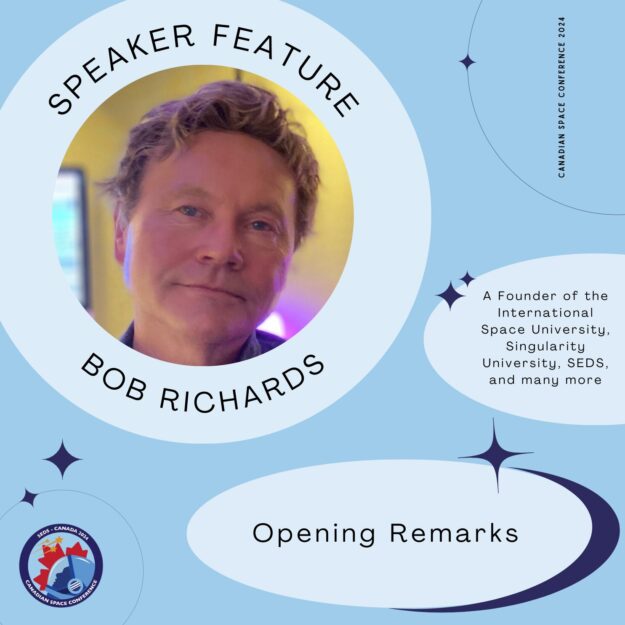
Bob Richards is a Founder of the International Space University, Singularity University, SEDS, the Space Generation Foundation, Odyssey Moon, Moon Express, Artemis Music and PlanetaryX. A commercial space entrepreneur with roots in the music and entertainment industry, his terrestrial business ventures span digital media, retail, hospitality, automotive, communications and publishing.
Bob studied aerospace and industrial engineering at Ryerson University; physics and astronomy at the University of Toronto; and space science at Cornell University where he became special assistant to Carl Sagan. As a student Bob co-founded Students for the Exploration and Development of Space (SEDS), the Space Generation Foundation and International Space University.
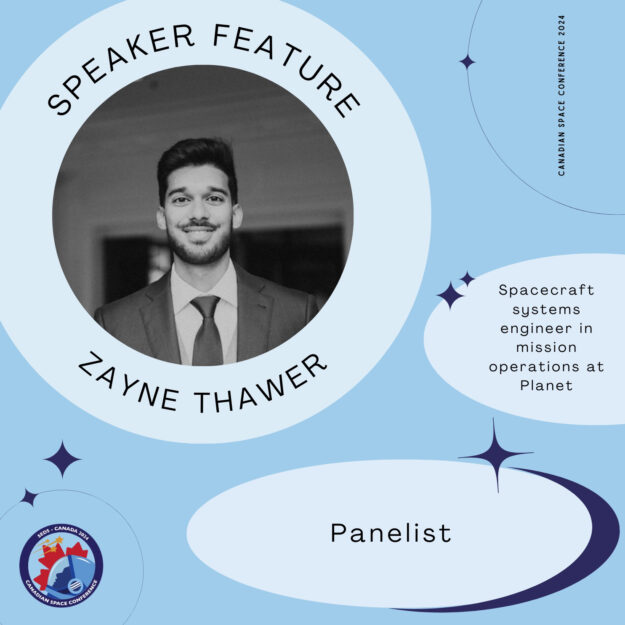
Zayne Thawer is a spacecraft systems engineer in mission operations at Planet. He contributes to the operation of the largest constellation of commercial Earth observation satellites in the world. Zayne graduated as an EngSci Aero 2T0 + PEY from UofT, after which he completed his MS at Caltech in Space Engineering. His past research and work experience lies in space propulsion, spacecraft systems design, mission operations, and CFD. He currently resides in California with his wife.
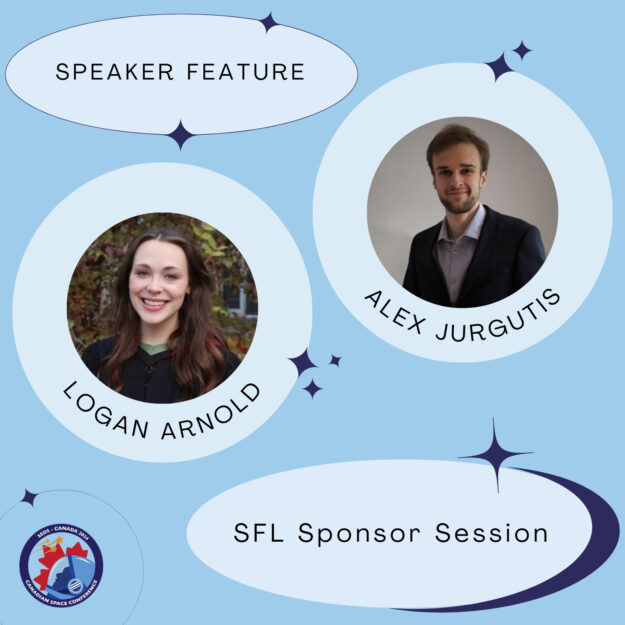
Alex is a master’s candidate at the University of Toronto Institute for Aerospace Studies’ Space Flight Laboratory (SFL). He has experience with spacecraft communications, RF design, assembly, integration and testing, and spacecraft commissioning and operations.
Logan is a graduate student working on a MASc in Aerospace Engineering at the Space Flight Laboratory (University of Toronto Institute for Aerospace Studies). She has experience working on deployables, thermal design, and spacecraft assembly and testing. In her free time, Logan is the Social Media Manager for the Zenith Canadian Pathways Foundation.
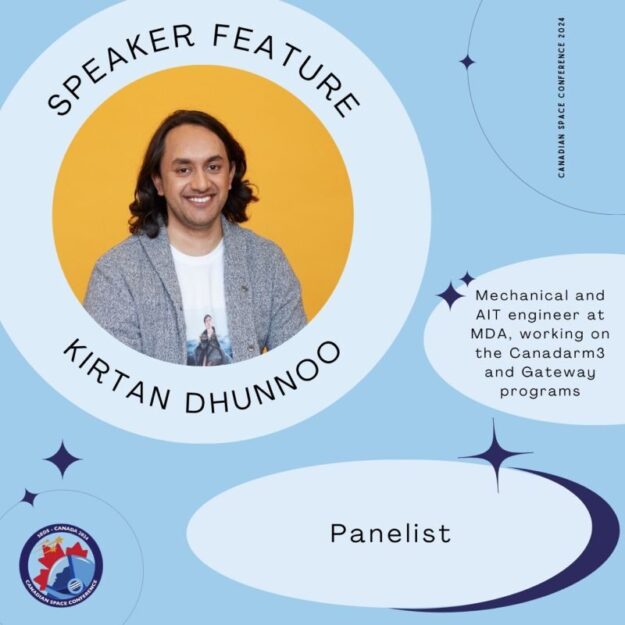
Kirtan Dhunnoo is a Mechanical and AIT engineer at MDA, working on the Canadarm3 and Gateway programs. While he has been involved in preliminary subsystem design work for the arm itself, his main contribution is to mechanical prototype design and testing activities for the Gateway XLA end effector and grapple fixtures, from the very beginning. He is currently AIT Lead for the XLA interfaces program.
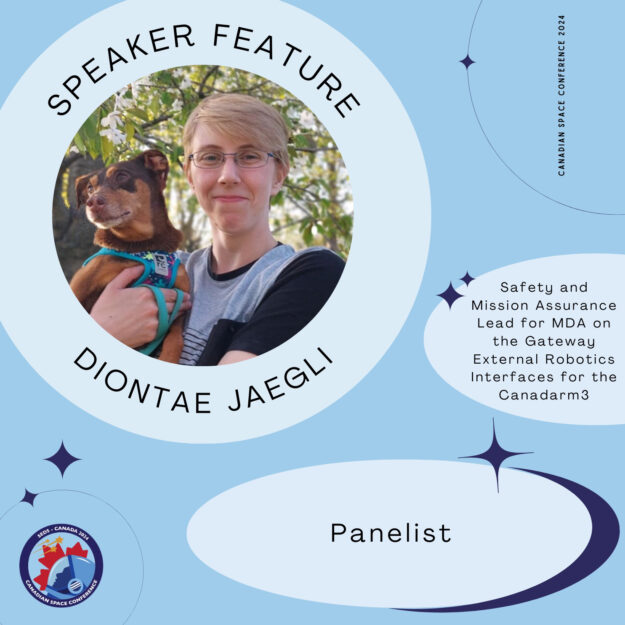
Diontae Jaegli is a Safety and Mission Assurance Lead for MDA on the Gateway External Robotics Interfaces for the Canadarm3. He oversees the application of safety and quality procedures and failure investigation during the design, test, and build phases of the program. Diontae also conducts risk mitigation for on-orbit phase through hazard analysis and control with CSA and NASA Safety Review Panels.
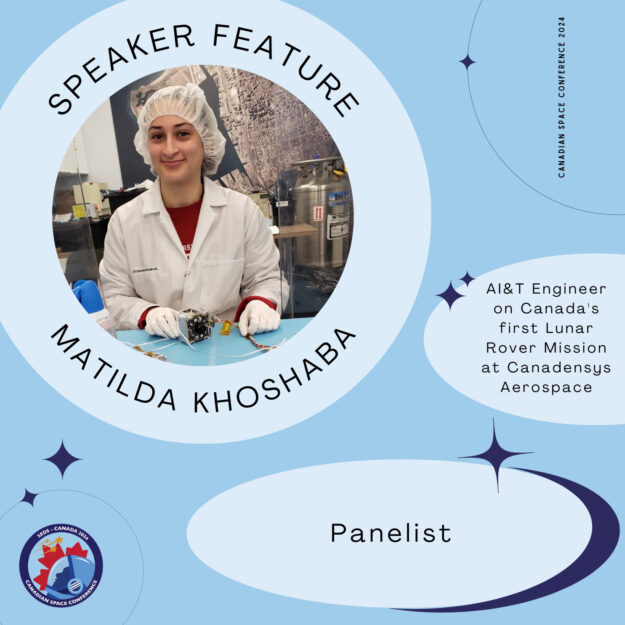
Matilda K. is an Assembly, Integration, and Test (AI&T) Engineer on Canada’s first Lunar Rover Mission at Canadensys Aerospace! She graduated from the University of Toronto in 2022 with a BASc. in Mechanical Engineering (Mechatronics and Energy Streams). Matilda knew the Aerospace field was where she envisioned herself working and was determined to gain Aerospace experience in her undergrad by seeking opportunities outside of her engineering courses. Matilda joined the UTAT rocketry team as a Propulsion and Structures team member and achieved a Liquid Rocket Propulsion Co-Lead position in her 4th year. At a 12-month internship at Canadensys Aerospace after her third year of school, Matilda worked on the design, build, and test of a Nano-Rover rover prototype that introduced her to the exciting world of Space AI&T. Through training and mentorship from the highly experienced team at Canadensys, she continues to build her Systems and AI&T skills as she plans the integration and testing of various rover systems. Outside of engineering, Matilda enjoys travelling, spending time with family and friends, weight lifting, and jumping into spontaneous adventures like Sky-diving for charity. Matilda believes in the importance of facing her fears and doing things out of her comfort zone, as all of the best opportunities she has experienced were because she decided to say “YES!”.
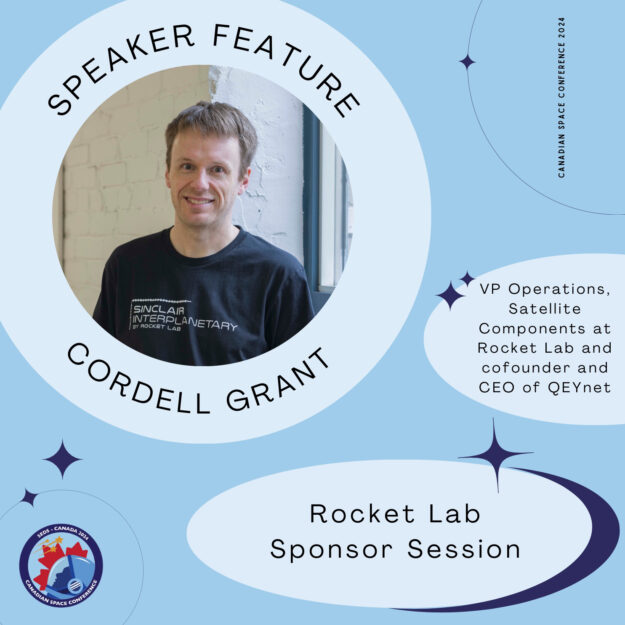
Cordell Grant has been active in the Canadian space industry for over 20 years. He has a bachelor’s degree in mechanical engineering from Dalhousie University. In 2005, he obtained a master’s degree from the University of Toronto Institute for Aerospace Studies, Space Flight Lab where his thesis focused on the design of CanX-2, a satellite that went on to become Canada’s first operational CubeSat. He stayed at SFL a further 11 years and, as Manager of Satellite Systems, oversaw cutting-edge missions including BRITE-Constellation (the world’s smallest space telescope), the CanX-4&5 formation flying mission, GHGSat’s first satellite (GHGSat-D) and Telesat’s LEO2 mission. In 2016, Cordell joined Sinclair Interplanetary as Chief Operating Officer. When the company was acquired by Rocket Lab in 2020, he assumed the title VP Operations, Satellite Components, and took over leadership of the Toronto office later that year. Cordell is also cofounder and CEO of QEYnet, a startup developing quantum communication solutions for space applications. In 2017, Cordell had the privilege to be among the final 72 candidates in the most recent Canadian astronaut selection.
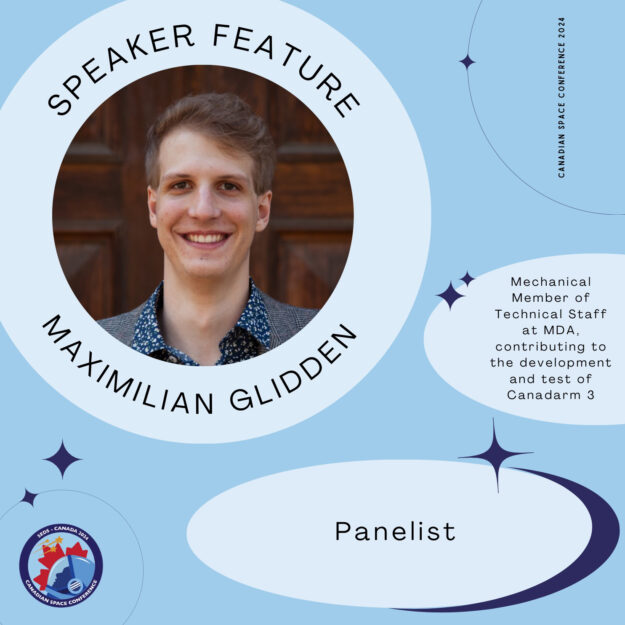
Max Glidden is an Mechanical Member of Technical Staff at MDA, currently supporting the development and test of Gateway robotic interfaces for Canadarm 3. Previously, he lead MDA’s early robotic interface lunar dust testing and supported lunar dust mitigation efforts for Canadarm 3 in conjunction with the Canadian Space Agency. Passionate about space and robotics from a young age, Max holds a BASc in Mechanical Engineering from the University of Toronto.
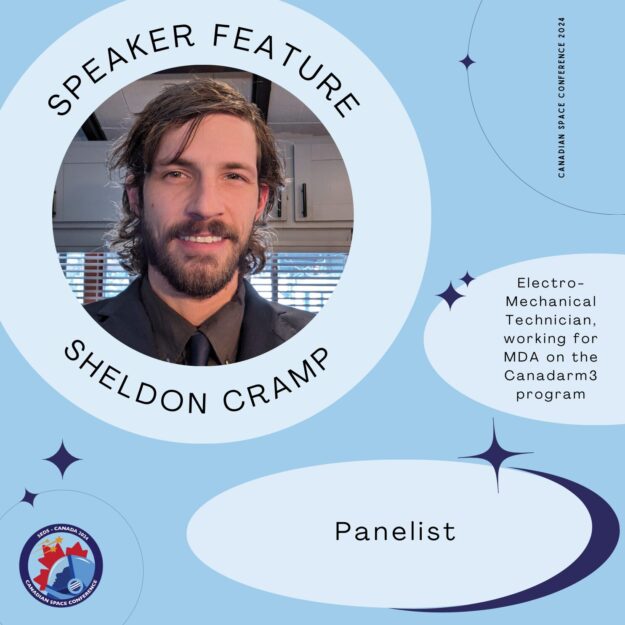
Sheldon Cramp is an Electro-Mechanical Technician, working for MDA on the Canadarm3 program. By trade, he is a General Machinist, and completed his apprenticeship with Conestoga College. Before joining MDA and the space industry, Sheldon went to school for Automotive Engineering, and spent some time pursuing a love for engine building and custom vehicle fabrication. He has been working on the Canadarm3 program since 2019, and has been very lucky to assemble and work with the engineering team through the earliest prototypes for the program. Sheldon’s passion is in developing and building mechanical assemblies and he is looking forward to soon building the flight models for the Canadarm3 program.
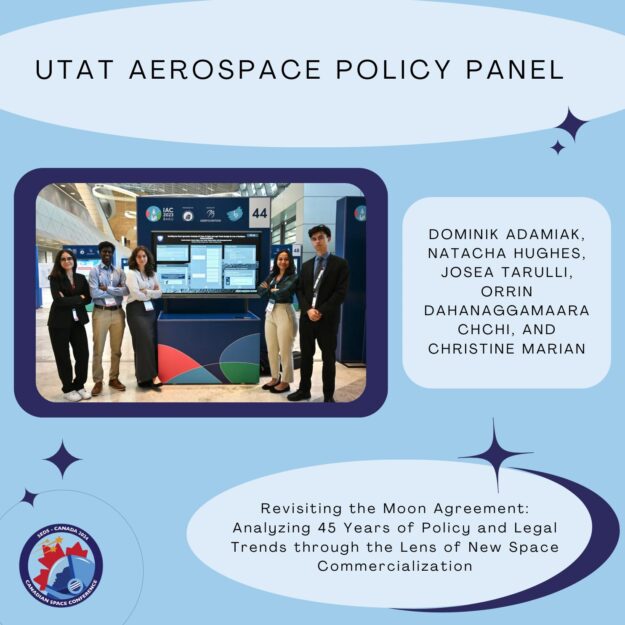
Dominik, Natacha, Josea, Orrin, and Christine, all studying engineering at the University of Toronto, are part of the Aerospace Policy Division at UTAT. The UTAT Aerospace Policy Division aims to encourage the University of Toronto and international aerospace communities to adopt practices that foster long-term aerospace sustainability through policy-oriented research and science communication and outreach. They collaborated on a research project addressing the gaps in space law left by the Moon Agreement. Their work involved analyzing terrestrial legislation, academic proposals, and domestic and international space legislation to predict likely resolutions for emerging issues in space governance, resource/property rights, and enforcement. Notably, their findings were presented at the 2023 International Astronautical Congress in Baku, Azerbaijan.
